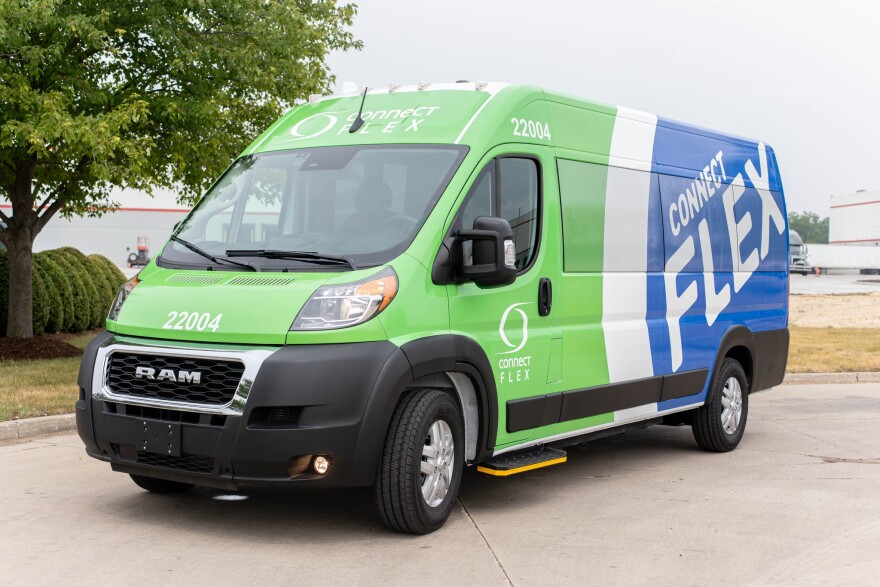The agency that runs public busing in Bloomington-Normal will likely be taking over rural public transportation in McLean County starting next summer.
Earlier this year, McLean County pulled out of its agreement with Show Bus for low-cost rural transportation starting next summer. The Chenoa-based company provides rural service in nine Central Illinois counties.

The county has chosen Connect Transit to take over the service. It's funded mostly by state and federal grants.
Connect Transit managing director David Braun said the Illinois Department of Transportation has commissioned a study to help determine what service Connect Transit could provide with the least impact on Bloomington-Normal service.
“The nature of the service will change a little bit in terms of how we are actually going to provide that service on a day-to-day basis and where we actually provide that service. Those conversations are still taking place,” Braun said in an interview on WGLT’s Sound Ideas.
Braun added the transit agency still needs to get approval from the City of Bloomington and Town of Normal because their existing intergovernmental agreements call for the Connect Transit to operate only within city and town limits.
Braun believes the service will benefit the Twin Cities, too.
“We’ll be able to get people into the city and town to go shopping to serve their needs a little differently than Show Bus does right now,” Braun said, adding that Connect Transit is exploring on-demand rural service.
Show Bus currently runs routes from Bloomington-Normal to several McLean County communities each week, including Chenoa, Lexington, Towanda, Bellflower, LeRoy, Downs and Saybrook.
Braun said the service will depend on whether it will need additional funding and may consider fares, when it takes over the service July 1, 2025. He anticipates the service will get $1.3 million from Illinois’ Downstate Operating Fund and $284,000 in federal funds distributed by the state.
State funding help
Braun said the statewide transit fund is getting depleted and could force many transit agencies to reduce services in the next few years, noting the state fund is becoming unsustainable because of Illinois' population loss.
“We have an opposite problem. Our area continues to grow and as that growth occurs, we cannot serve the population that’s growing outside of our current route network,” said Braun, adding Connect Transit's local funding is not derived from property taxes unlike many transit agencies.
The fund comes from statewide sales tax collections. Braun said the fund may only have about three years left before transit agencies will have to consider cutting back services.
Braun noted Bloomington and Normal approved funding increases in recent years and Connect Transit isn't prepared to seek additional local funding.
"We need to continue to demonstrate our worth to the city and the town and make it a valuable service to them," Braun said.
He added Connect Transit’s on-demand services, including Connect Mobility, may be a starting point for reductions. Connect Mobility is for riders who are disabled or are otherwise unable to access fixed-route buses.
“As that continues to grow, that’s a very expensive service to provide because it is on-demand. Where it contracts, how It contracts, [if it] contracts are all things we would have to consider,” he said.
Braun, who recently spoke to a state legislative panel asking it to reconsider the state's funding formula for public transit, said the transit agency doesn't plan to raise fares because he's concerned that would lead to a drop in ridership.
Connect Transit last raised fares in 2020 when it went to a one-fare-for-all format of $1.25.
Transfer center
Connect Transit is awaiting for architectural designs to come back with several options for its planned $18 million transfer center in downtown Bloomington.
Braun said those designs are expected in early 2025. At that time, he said the transit agency will have to determine whether it would be cost effective to build in leasable space for commercial businesses. He said the project is about $5 million short to build it out fully.
“Back in 2109, $18 million went a further way than it does now,” said Braun, referring to when state and federal grants were approved for the project. “We’re anticipating the costs of this facility to be a little higher.”
Braun said Connect Transit may look to do a market study to determine whether it can afford to add the commercial space and could start a capital campaign to offset the costs of come capitol amenities.
Construction is planned to start late next year and for the site to be completed in 2026.


